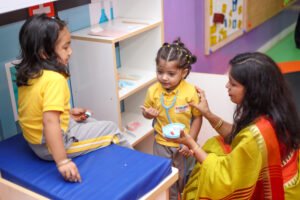The Importance of Play-Based Learning in Preschools
Play-based learning is a core method in early childhood education that recognises young children’s natural desire to learn via play. It emphasises the importance of hands-on discovery, social engagement, and creative activities in promoting holistic development. At Kidzonia, we ensure that children learn via play, and the following are some major themes illustrating the significance of play-based learning in which we believe:
Cognitive Development: Play-based learning involves children in problem-solving, critical thinking, and decision-making tasks. They improve cognitive abilities such as memory, attention, and focus through play. Playing scenarios also promotes innovative thinking and creativity, both of which are necessary for future academic achievement.
Social and emotional development: Play allows youngsters to communicate with one another, negotiate, cooperate, and exchange ideas. It encourages the development of important social skills including empathy, communication, and dispute resolution. Children may explore diverse roles, comprehend emotions, and build self-regulation abilities via pretend play.
Physical Development: Play-based learning promotes fine and gross motor skill development. Building with blocks, painting, and participating in outdoor play all help to improve hand-eye coordination, balance, and muscular strength. Play also promotes active movement and physical fitness, which improve general health and well-being.
Language and Literacy Development: Play provides rich linguistic experiences for children as they participate in discussions, explain their activities, and communicate their ideas and emotions. It serves as a setting for vocabulary development, storytelling, and the comprehension of narrative frameworks. Children lay the groundwork for subsequent literacy abilities such as reading, writing, and understanding via play.
Holistic Learning: Play-based learning fosters a well-rounded development that includes cognitive, social, emotional, and physical dimensions. It recognises that children learn best when their inherent curiosity and interests are stimulated via play. Preschools establish an atmosphere that fosters children’s overall development by balancing scheduled activities with child-initiated play.
Motivation and Engagement: Play-based learning engages children’s innate drive and natural curiosity, making learning joyful and meaningful. Children who actively participate in play are more likely to retain knowledge and develop a lifetime love of learning. It promotes a favourable attitude towards education and lays the groundwork for future academic endeavours.
Individualised Learning: Because children may pick activities depending on their interests, abilities, and developmental requirements, play-based learning allows for individual variances. It fosters personalised learning experiences and encourages educators to adjust and customise their teaching methods to match the individual needs of each kid.
To summarise, play-based learning is an effective technique in preschool education that recognises and encourages young children’s inherent learning inclinations. Preschools create the framework for children’s lifetime learning, social development, and academic achievement by offering an engaging and nurturing play environment.







